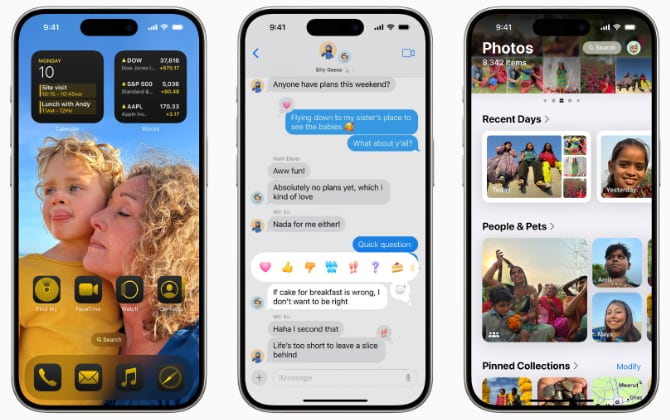Apple’s annual WWDC event always highlights the company’s latest software, but this year AI was the star of the show – though only owners of iPhone 15 Pro and newer devices will be able to take advantage of these AI features. It's Apple's first big step into AI, bringing a bunch of conveniences to iPhone, iPad, and Mac. And even though these additions mirror what many other companies are doing with AI, I welcome them making it to the iPhone.
However, these new features aren't all about AI, as there are some neat customizations coming to iOS 18 later this year, which will be available for the iPhone X and up, as well as the iPhone SE 2nd gen and higher. These features are a little less exciting, but a lot more of us will be able to use them.

What’s coming in iOS 18?
This year’s iOS update focuses on customization, and while its features aren’t exactly revolutionary, they are nice. Here are the highlights of iOS 18:
- Homescreen customization, letting you arrange apps and widgets anywhere on the screen you’d like, leaving space to admire your wallpaper.
- Updated icons, with new icons just for Dark Mode as well as the ability to give icons a customizable color tint (iOS will suggest a color based on your wallpaper, but you can pick what you want).
- Control Center customization, rearrange, resize, and add additional pages of tools for media and smart home controls as needed. Third party apps will also be able to make Control Center tools.
- Customizable Lock Screen tools, so you can replace the default flashlight and camera options.
- Lock or hide specific apps so anyone using your phone can’t get into them without using Face ID, Touch ID, or a Passcode. Notifications from these apps also won’t show.
- New privacy features allow you to limit app access to your contacts or your local network of devices, so you can give apps necessary access without letting them access everything.
- Messages has new tapback reactions, text formatting (bold, italic, underline, or strikethrough) and effects. You can also send iMessages or SMS messages via satellite if you’re out of service range, and RCS support is also (finally) coming to the app.
- Mail will now automatically categorize items into Primary, Transactions, Updates, and Promotions, much like Gmail’s Priority Inbox. It will also be better about bringing information together, such as pulling up all information on a flight or trip if the information is in your mailbox.
- Maps now has topographical maps that you can download, and includes trail networks and hiking routes, with turn-by-turn voice guidance and the ability to program personalized hikes.
- Photos app gets a redesign, with a single unified view with a photo grid at top and your library organized by topic below. Easily filter photos and customize the display however you’d like.
- New Passwords app that expands the existing iCloud Keychain into a full-fledged password manager for iOS, iPad, Mac, and Windows.
This grab bag of changes is the list of the most interesting iOS 18 updates for most of us. They’re all nice updates, though not particularly exciting.
Read more: Apple's adoption of RCS eases texting woes between iPhone and Android
Apple Intelligence is Apple’s take on AI
All of the excitement for iOS 18 comes from the new AI features, which Apple calls “Apple Intelligence.” It seems like everyone is adding AI to their products lately, and if you’ve been following Microsoft and Google many of these features will be familiar, but it’s great to see them coming to Apple devices.
Apple claims its AI stands out from the crowd due to enhanced privacy and personalization – it’s not artificial intelligence, but personal intelligence. Like Microsoft's Recall feature, which tracks everything you do on your Windows PCs, Apple Intelligence will know everything about what you do on your iPhone. Using your personal data will give your iPhone the context to understand what you're asking and provide more relevant responses.
The latest Apple processors were built with AI features in mind, with the power to run many AI features locally. This is a big a win for privacy, because when queries are processed on your device, your data isn’t sent anywhere to be saved or used for unknown purposes. But even these devices only having so much power, and more complicated processes may be sent to what Apple calls “Private Cloud Compute.” Apple promises that your data is never saved or used except to process your query.
Here's what you can expect from these new Apple Intelligence tools.
Siri gets smarter
Siri plays a big role in these new AI features. Apple’s original voice assistant can do more than ever, accurately processing natural language requests (including remembering previous requests and understanding context) as well as being able to perform actions across apps. Siri can even understand you if you stumble over your words or change your question mid-stream. But the killer feature is how Siri can bring information together. You can ask to play the podcast your wife sent you – Siri knows who your wife is and will find the podcast whether it’s in email or messages. You can ask it to find photos by just describing them, then ask for it to make the picture pop and it will adjust color and contrast, then ask for it to add it to an email or document. Siri will seamlessly pick up context and jump from app to app.
A new suite of generative AI writing tools
AI-powered writing tools will also be built in across apps. You can select text to proofread it, suggest edits, or change the tone of the message until it’s just right. When you respond to an email, Apple Intelligence can create a response and then prompt you to answer questions the email asked. If your email is getting long, you can automatically add a summary or key points with a single tap. Similarly, Apple Intelligence can summarize content for you, whether it’s an email or a webpage. In Safari, it will highlight key information to direct you to what you need to know. You can also record phone calls, which will be transcribed and can similarly be summarized.
Prioritized notifications
One of the biggest challenges all of us face is general digital information overload. AI will prioritize notifications, sorting through your notifications for you and showing the most important at the top of the stack. It can do the same with email, displaying higher priority, time- sensitive messages at the top. A new “Reduce Interruptions” Focus option will silence most notifications so you can focus, but it will pop up messages that likely need your immediate attention.
Automatically create and edit images
Apple Intelligence also powers a new image generation tool with Image Playground. The images it produces lean towards cartoony and stylized; avoiding the thorny issue of deceptive imagery, which some social networks restrict. You can make custom emoji (which Apple calls “Genmoji”) or create quick images on the fly to reply to messages or share on social media. In the Notes app, circle a sketch to have it turned into an image – or circle an empty space to have AI create an image based on your text. In Photos, you can clean up your images by circling items you’d like to remove, like extra figures behind your otherwise-perfect family photo.
ChatGPT integration
And if Apple Intelligence can’t do it, ChatGPT can. If Apple Intelligence thinks ChatGPT will be better able to address a query, it will ask if you’d like to use it. (You don’t need an account, though if you have a subscription you can log on and access subscriber features.) You could, for example, ask ChatGPT to write a bedtime story for your child based on your prompts, and even add images. Apple promises more generative AI tools will be available in the future.
All of these new AI features will work across apps, both Apple apps and third-party apps that support them.
Read more: Can You Spot the Fake? Meta to Start Calling out AI Images
Which devices support Apple Intelligence?
Not many, particularly amongst iPhones. AI will be available only on the iPhone 15 Pro and iPhone 15 Pro Max, which have the A17 Pro chip; if you have an older iPhone, you’ll get the new iOS 18 customization features and other additions, but none of the new AI features. It’s certainly a push to upgrade your iPhone.
For Mac and iPad, Apple Intelligence will be available on devices with an M1 chip or better, which includes most products released in the past four years.
When will iOS 18 be available?
There isn’t an official release date for iOS 18 yet, but Apple promises it will be available this fall.
[Image credit: Apple]
Elizabeth Harper is a writer and editor with more than a decade of experience covering consumer technology and entertainment. In addition to writing for Techlicious, she's Editorial Director of Blizzard Watch and is published on sites all over the web, including Time, CBS, Engadget, and DealNews.

















